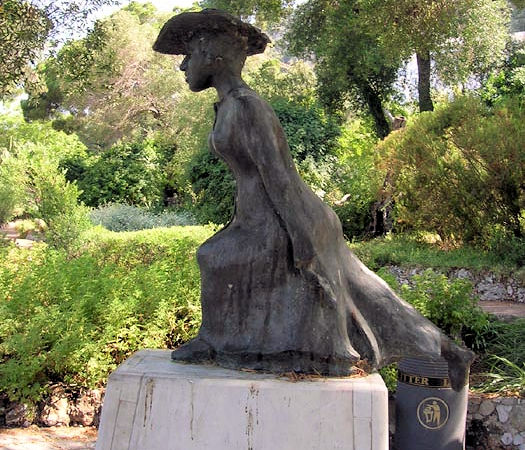Some Notes Concerning Molly Bloom's Solliquy in the Final Episode [18] of Ulysses

Statue of Molly Bloom in Alameda Botanical Gardens, Gibraltar
The text in Ulysses that provided the biggest hurdle for Random House, and which was pointed to most urgently by would-be censors, was Molly Bloom’s soliloquy in “Penelope,” the eighteenth and final episode of the book. (Molly corresponds, in a rough way, to the character Penelope in Homer’s Odyssey—though she strikingly lacks Penelope’s eternal faithfulness.) The soliloquy contains highly sexual language which James Joyce himself described as “probably more obscene” than any preceding episode.
Molly Bloom is the fictional wife of Leopold Bloom, the central character of the book. She was born in Gibraltar in 1870, the daughter of an Irish military officer and a Gibraltarian of Spanish descent. In Dublin, where the novel takes place, Molly is a well-known opera singer. Molly and Leopold for years have had a sexless relationship, but Molly is still in her sexual prime and has slept with many men—a fact her husband is well aware of.
Molly’s soliloquy begins after Leopold settles into bed, muttering something about eggs. In bed herself, lying next to her husband, Molly finds that sleep does not come easy. Her mind begins to meander from Leopold’s eggs to the events both of the previous day (June 16, 1904) and memories from her more distant pass. Joyce reports Molly’s thoughts in a stream-of-consciousness style that all but completely lacks punctuation. The approximately 22,000-word soliloquy consists of eight extremely long “sentences,” the last alone being 4,391 words, making it (until 2001) the longest “sentence” in the English language.
Molly’s thoughts move from Leopold’s health, to recollection of his rather pitiful attempts at infidelity, to memories of her own much more fulfilling sexual adventures. Just this day, she had been with her most recent lover, Blazes Boylan, a concert impresario, for what her husband well knew was not a business meeting. Molly describes her sexual encounters in graphic detail. (Her words, especially her references to excretory and sexual functions, fill up pages of government briefs in the obscenity case.)
Molly’s mind also slips back to her childhood in Gibraltar, or moves forward to her preparation for songs she will be singing on an upcoming concert tour. As she finally drifts towards sleep, her last thoughts turn to her first meeting with Leopold, and the moment she knew she was in love with him. The last words of the book are:
I was a Flower of the mountain yes when I put the rose in my hair like the Andalusian girls used or shall I wear a red yes and how he kissed me under the Moorish Wall and I thought well as well him as another and then I asked him with my eyes to ask again yes and then he asked me would I yes to say yes my mountain flower and first I put my arms around him yes and drew him down to me so he could feel my breasts all perfume yes and his heart was going like mad and yes I said yes I will Yes.
In a 1921 letter, Joyce said, “The last word (human, all too human) is left to Penelope." He noted that the last word of the episode, as well as the first word, is "yes, a word that Joyce described as "the female word" and that he said indicated "acquiescence, self-abandon, relaxation, the end of all resistance.”
